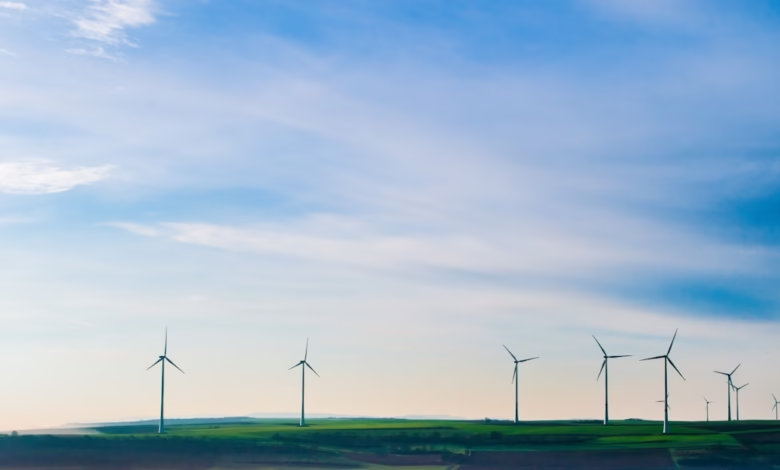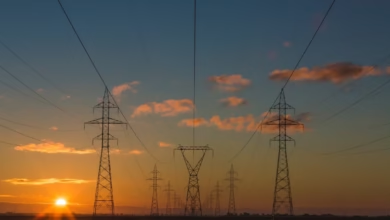Navigating Energy Security: Strategies for a Reliable Supply Amid Climate Change and Global Trends

In a world increasingly marked by climate change and political uncertainty, energy security has emerged as a critical concern for nations and businesses alike. Ensuring a stable and reliable energy supply is not just a matter of economic stability; it is essential for fostering sustainable growth and maintaining social order. As global energy trends shift towards more sustainable practices, the reliance on fossil fuels is gradually waning, making way for a diverse energy portfolio that includes renewable energy sources like solar power, wind energy, hydropower, and bioenergy.
This article delves into the multifaceted nature of energy security, examining its importance in today's rapidly evolving landscape. We will explore how energy efficiency and innovative technologies, such as energy storage and smart grids, are pivotal in facilitating a smooth energy transition. Additionally, the discussion will highlight the role of energy policy and investment in shaping the future of energy markets, addressing both energy imports and exports. By understanding these dynamics, we can better navigate the complexities of energy security in an era defined by climate challenges and technological advancements. Join us as we uncover the pathways to a more resilient and sustainable energy future.
- 1. The Importance of Energy Security in a Changing Climate: Navigating Global Energy Trends
- 2. Renewable Energy and Energy Efficiency: Key Drivers for a Sustainable Energy Transition
- 3. Innovations in Energy Storage and Smart Grids: Enhancing Reliability and Resilience in Energy Supply
1. The Importance of Energy Security in a Changing Climate: Navigating Global Energy Trends
Energy security is becoming increasingly vital as the world grapples with the impacts of climate change and the need for a sustainable future. In today's rapidly evolving landscape, navigating global energy trends requires a comprehensive understanding of how various energy sources interplay, particularly in terms of reliability and sustainability.
As countries strive to transition from fossil fuels to renewable energy, the importance of energy security cannot be overstated. The shift towards green energy sources like solar power, wind energy, and hydropower is essential for reducing carbon emissions and achieving climate goals. However, this transition must be managed carefully to ensure that energy markets remain stable. The integration of renewable energy technologies with energy storage solutions is critical in addressing the intermittent nature of sources like solar and wind, enabling a more reliable energy supply.
Incorporating innovations such as smart grids and energy efficiency measures can further enhance energy security by optimizing the distribution and management of energy resources. Additionally, investing in energy R&D is crucial for advancing technologies like carbon capture and hydrogen energy, which can play significant roles in both energy transition and security.
As nations navigate this complex landscape, energy policy will dictate how energy imports and exports are handled, particularly in the context of fluctuating global energy markets. The balance between thermal energy generation and cleaner alternatives, such as nuclear energy and bioenergy, must be carefully managed to ensure a resilient energy supply while also addressing climate change.
Moreover, the rise of electric vehicles and distributed energy systems presents both opportunities and challenges for energy security. These innovations can lead to more localized energy production and consumption, reducing dependence on traditional energy transportation methods and enhancing resilience against potential disruptions.
In conclusion, ensuring energy security in the face of climate change demands a multifaceted approach that embraces renewable energy sources, enhances energy efficiency, and fosters international cooperation in energy investments. By staying attuned to global energy trends and prioritizing strategic energy policies, countries can achieve a stable and reliable energy supply that meets the needs of future generations.
2. Renewable Energy and Energy Efficiency: Key Drivers for a Sustainable Energy Transition
The transition toward a sustainable energy future relies heavily on renewable energy and energy efficiency as crucial drivers. As global energy trends shift away from fossil fuels, the integration of green energy sources like solar power, wind energy, hydropower, and bioenergy has become imperative in enhancing energy security. These renewable energy sources not only reduce dependency on traditional fossil fuels but also contribute to lowering greenhouse gas emissions, directly addressing climate change concerns.
Energy efficiency plays a vital role in this transition. By optimizing energy use in various sectors, including residential, industrial, and transportation, we can significantly reduce overall energy demand. The adoption of smart grids allows for better management of energy consumption, facilitating the integration of distributed energy resources. These advancements lead to improved energy economics, making renewable energy more competitive in energy markets.
Investments in energy R&D are essential for developing innovative technologies such as carbon capture and thermal energy storage. These technologies enhance the viability of renewable energy by addressing intermittency issues and providing reliable energy supply, thereby reinforcing energy security. Additionally, hydrogen energy is gaining traction as a versatile energy carrier, offering solutions for sectors that are hard to decarbonize, such as heavy industry and transportation, including the use of electric vehicles.
Moreover, energy policy must evolve to support the growth of offshore energy and the expansion of energy imports and exports, ensuring a balanced and resilient energy strategy. By prioritizing energy innovations and diversifying energy sources, nations can secure stable energy supplies while promoting sustainability. This strategic approach not only aids in the global energy transition but also aligns with broader climate goals, ensuring a secure and sustainable future for all.
3. Innovations in Energy Storage and Smart Grids: Enhancing Reliability and Resilience in Energy Supply
Innovations in energy storage and smart grids are pivotal in enhancing the reliability and resilience of energy supply, particularly as the world transitions towards renewable energy sources. The ongoing energy transition aims to reduce dependence on fossil fuels while increasing the share of green energy in the global energy mix. This shift necessitates advanced technologies to manage energy generation and consumption efficiently.
Energy storage plays a crucial role in addressing the intermittent nature of renewable energy sources like solar power and wind energy. By storing excess energy generated during peak production times, these innovations ensure that energy is available during periods of low generation. Technologies such as lithium-ion batteries, pumped hydro storage, and emerging hydrogen energy solutions are at the forefront of energy storage advancements. These systems not only enhance energy efficiency but also contribute to energy security by balancing supply and demand, thereby stabilizing energy markets.
Smart grids are another significant innovation that enhances the overall resilience of the energy supply. These advanced energy systems utilize digital technology to monitor and manage the flow of electricity from all generation sources, including renewable energy, nuclear energy, and fossil fuels. Smart grids facilitate real-time communication between energy producers and consumers, enabling better demand response and load management. This capability is particularly important as electric vehicles gain popularity, further transforming energy consumption patterns.
Moreover, smart grids support distributed energy resources (DER), which include small-scale hydropower, bioenergy, and thermal energy systems. By integrating these diverse energy sources, smart grids promote energy decentralization, reducing reliance on centralized fossil fuel power plants. This diversification not only enhances energy security but also aligns with global energy trends that prioritize sustainability and climate change mitigation.
Investing in energy R&D is crucial for advancing these technologies. Governments and private sectors must collaborate to develop policies that encourage innovation in energy storage and smart grid infrastructure. Such investments not only bolster energy security but also position countries as leaders in the burgeoning global energy market, enhancing their capacity for energy exports while reducing energy imports.
In summary, the integration of innovative energy storage solutions and smart grid technologies is essential for improving the reliability and resilience of energy supply. As we move towards a cleaner energy future, these innovations will play a vital role in ensuring a stable energy landscape that meets the demands of climate change and the evolving energy economy.
In conclusion, energy security is essential for navigating the complexities of a changing climate and evolving global energy trends. As we strive for a stable and reliable energy supply, it is imperative to prioritize renewable energy and energy efficiency as key drivers of a sustainable energy transition. Innovations in energy storage, smart grids, and diverse energy sources such as solar power, wind energy, hydropower, and bioenergy play a crucial role in enhancing the resilience of our energy systems. By investing in advanced technologies, such as carbon capture and hydrogen energy, we can significantly reduce our reliance on fossil fuels and nuclear energy, paving the way for a greener energy future.
Furthermore, comprehensive energy policy that supports the development of distributed energy systems and energy transportation is vital for fostering energy markets that are both robust and competitive. As we continue to explore energy R&D opportunities and promote electric vehicles, we must also focus on ensuring that energy exports and imports align with our sustainability goals. Ultimately, the pursuit of energy security must be at the forefront of our efforts to combat climate change, ensuring that we create a reliable energy landscape that benefits both current and future generations. Embracing these strategies will not only enhance energy innovations but also secure a prosperous, sustainable future for our planet.





